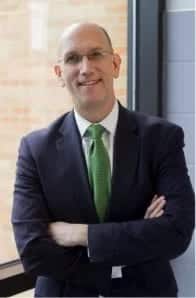Table of Contents
A Broader Vision of Education to Prepare Students for Future Success
Over the years, I have come to know Randy Ziegenfuss, Superintendent of Salisbury Township School District, Allentown, PA and I’ve always appreciated his candid insight on what is happening in education, particularly in the world of superintendents. In this interview, conducted at the AASA conference in New Orleans, Randy talks about the future of education and what the world is going to be like when today’s kindergarteners are ready to graduate and move on to college and careers.
Randy talks about a narrowed vision trap that we all tend to fall into regarding the traditional use of assessment and grading. The vision pushes its way down the chain of command from the federal government to the states, to the districts, eventually taking residence in individual schools. Ziegenfuss believes in a broader, more comprehensive vision that he has titled, “Portrait of a graduate.” It’s a collective vision that concentrates on evaluation and preparation of the whole student to meet the future needs of the world.

As the landscape in education evolves and changes, it takes leadership that embraces the adaptation. Randy Ziegenfuss is a superintendent that embodies the vision and commitment necessary to put forward change. Whether it’s digital literacy, global competency or entrepreneurial practices, Randy prides himself on staying on top of changes that are beneficial to his students, faculty and fellow administrators.
I hope you enjoy the enlightening interview below.
Interview
Dr. Berger: Randy, what I love about our conversations is your willingness to be transparent about the role of superintendent, what you experience, and the way in which you evaluate the market. We can all learn from that
Tell me about how the role of the superintendent has evolved since you’ve been a superintendent.
Dr. Randy Ziegenfuss: I think, today, superintendents need to have a much broader perspective. In my case, one of the things that’s really on my radar is the future and how we’re preparing kids for that future.

I’ve become very much interested in it and I try to communicate this with my colleagues as well. You read about things like artificial intelligence and virtual reality. There are things that are happening now. There are signals out there of this changing world.
I feel that, as superintendents, we’re really not having that important conversation about those signals that are happening. What is that world going to be like whether you’re graduating in 2017 or in 2035 as our kindergarteners who are entering this year are?
I think the role of the superintendent, now more than ever, needs to be more visioning. It needs to take into consideration the changes that are happening in the context of the real world right now.
DB: Critics say that lack of visioning or willingness to talk about what that future might look like could be impacting the way in which we are managing our budgets at the district and the school level itself.
I think, sometimes, the general public thinks that a district struggles to manage the complexities of a school budget. And if you put that with potentially a lack of willingness to have that day-to-day conversation saying, “Look, if we’re going to incorporate virtual reality, there’s going to be a cost to that.”
How are we going to account for that? Where does that, from the practical side, fit into the vision that you’re talking about?
 RZ: One of the things that we’ve been doing in our school district over the last year and a half or so is working around a profile of the graduate, and then backing that up and saying, “If this is our vision, if these are the competencies that we want our students to have, what does the learning environment need to look like?” and having conversations around “What are those learning beliefs?”
RZ: One of the things that we’ve been doing in our school district over the last year and a half or so is working around a profile of the graduate, and then backing that up and saying, “If this is our vision, if these are the competencies that we want our students to have, what does the learning environment need to look like?” and having conversations around “What are those learning beliefs?”
That ties to a budget conversation or any conversation around resources. How do we allocate those resources based on that vision?
A lot of the conversations that we have now are around a very narrow vision of education. We’re looking down and we’re missing a lot of what’s going on in the world. And those conversations around resources and budget aren’t taking into consideration that wider vision. It’s a narrow vision ─ it’s oftentimes a vision that’s pushed down on us.
We have the federal government that’s creating a vision. Now, we’re in somewhat uncertain times as to what’s going to happen with that vision. That gets projected to the state. The state becomes very compliant with the federal. The state, then, tells superintendents and school boards what to do. When it gets down to the building level, we get conversations that are around this very narrow vision of “What is achievement? What is accountability?”
As a superintendent, it’s my role to push that conversation and say, “It needs to be a lot wider. Are we truly preparing our kids for the world that is really starting to develop and develop exponentially, too?” Educational organizations are linear-thinking organizations and the technology is changing exponentially.
And so, there’s this increasing gap. How does our vision shift around that and how do our conversations around how we allocate resources need to shift around that as well?
DB: One thing that had happened here recently that has been personally inspiring is that there are districts out there that are starting to ask very serious questions around the way in which we grade, the way in which we document learning. And you’re seeing some shifts in some very traditional approaches to education where we’re taking away report cards at certain levels and finding different ways to approach the process of documenting skill acquisition.
How do you look at that and is it a good sign that we’re seeing some movement and is there enough of it going on?

RZ: That’s a very interesting question because it fits in with that idea of vision, too. If we want to prepare kids for the real world, how are we assessed and evaluated in real-world projects and real-world tasks? It rarely is a grade. It rarely is a number.
But that number and that grade have a long history that’s grounded in the needs of a system. And a lot of what’s changing around the vision of education and learning is “How do we shift it from the needs of the system to the needs of the learner?”
It’s asking the question “Does the grade, the letter or the number, benefit the learner? How does it benefit the learner and is there something that better benefits the learner?”
That something is probably more frequent and valuable feedback that comes in a conversation or in written feedback as opposed to a letter grade or a number, which is taking a whole bunch of different factors and bringing them down into one finite, easily consumable letter or number. And what meaning does that really have?
It makes our lives a little easier, doesn’t it? I say that in jest meaning that we can put it on the shelf; we know where it goes.
DB: Yes.
RZ: But are we trying to make life easier for the system or are we trying to make the process of feedback more valuable for the learners?
I think that’s a shift that’s changing.
About Dr. Randy Ziegenfuss
 Dr. Randy Ziegenfuss currently serves as Superintendent in the Salisbury Township School District. Prior to his current position, Ziegenfuss, was a classroom teacher, Department Chair, Technology Integration Specialist, Director of Technology and Assistant Superintendent. Ziegenfuss is also a Clinical Adjunct Professor of Education at Moravian College, teaching courses in inquiry, assessment and technology in the undergraduate, graduate and principal certification programs.
Dr. Randy Ziegenfuss currently serves as Superintendent in the Salisbury Township School District. Prior to his current position, Ziegenfuss, was a classroom teacher, Department Chair, Technology Integration Specialist, Director of Technology and Assistant Superintendent. Ziegenfuss is also a Clinical Adjunct Professor of Education at Moravian College, teaching courses in inquiry, assessment and technology in the undergraduate, graduate and principal certification programs.
He graduated from Moravian College with a B.Mus. degree, earned his M.A. from Teachers College, Columbia University in technology leadership, and an Ed.D. from the University of Pennsylvania in educational and organizational leadership. In 2014, the Pennsylvania School Librarians Association (PSLA) recognized Ziegenfuss, as the Outstanding District Administrator for the state of Pennsylvania. In 2015, Ziegenfuss, was recognized by the Pennsylvania Association for Educational Communications and Technology (PAECT) as the Outstanding Leader of the Year.
Follow Dr. Randy Ziegenfuss on Twitter
Author
Dr. Berger is one of many industry education correspondents for the Mind Rocket Media Group, An educator and former school administrator. His video interview work and conversational podcasts have been featured in various media outlets. He often hosts education panel discussions and develops strategic content. As an academic Dr. Berger is a guest lecturer at Vanderbilt University’s Owen Graduate School of Management. A former assistant principal, he has been an adjunct undergraduate professor and developer of online college courses. He is a passionate Detroit sports fan who has also adopted Nashville sports teams as his own.
Contact the Mind Rocket Media Group if you are interested in an industry interview and a placement on EdCircuit.



